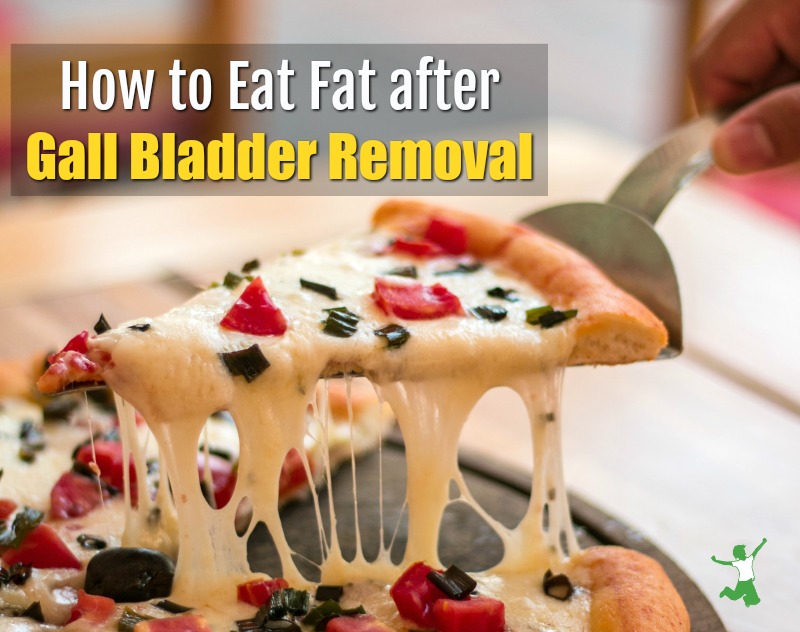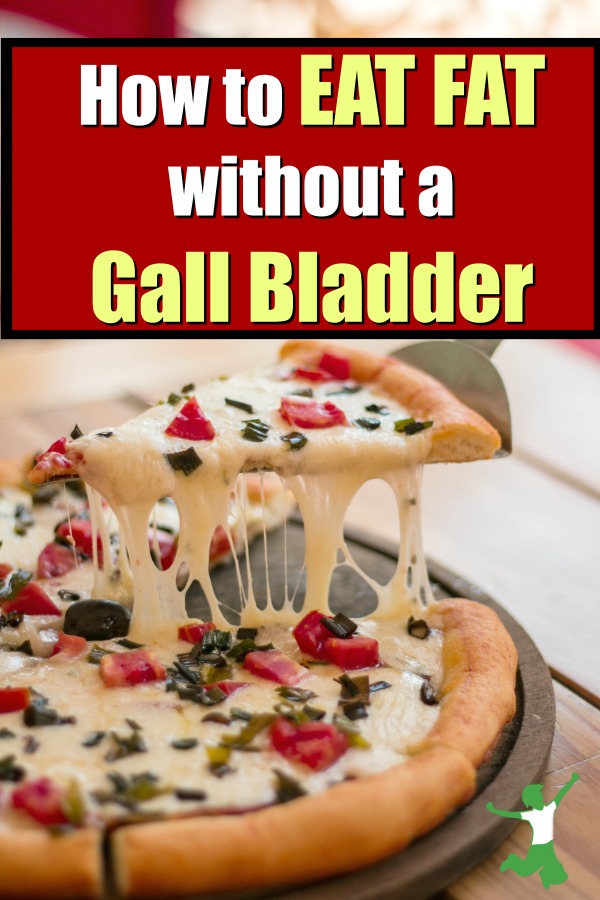How to eat fat comfortably without digestive distress after gall bladder removal. This ensures adequate fat-soluble vitamins in the diet for optimal health and vitality.
How to eat fat comfortably after gallbladder surgery seems to be an increasingly common dilemma nowadays. You have to wonder if these people tried a simple, doctor-developed gall bladder cleanse before deciding to go under the knife.
Sadly, their practitioners probably never suggested this first.
Why in the world are so many people having problems with this small organ that aids in fat digestion by storing and concentrating bile produced by the liver?
Could the gallbladder laparoscopic surgery epidemic that is occurring even in young girls be related to our fat-phobic society? (1, 2)
Constantly eating rancid fats or avoiding healthy ones like butter has the potential to trigger a malfunctioning or atrophying organ from lack of proper use.
Whatever the reason, there are indeed a lot of folks walking around without a gallbladder. Many are under the incorrect impression that after removal they can no longer eat fats without digestive discomfort.
YES! You Can Eat Fat without a Gallbladder
The first thing to realize after gallbladder surgery is that you can most certainly still eat fat.
The bile necessary to digest most fat is made in the liver, not the gallbladder, and you still have a liver, right?
What you really need is a dietary strategy that compensates for the fact that your body no longer has a place to store and concentrate the bile.
The approach is similar to a person who has had her appendix removed. These people must replenish beneficial flora after intestinal illness because there is no longer a place where good bacteria remain secure during bouts of gastroenteritis.
Please note that the tips outlined below are also very helpful to those who have been eating lowfat for a long time and are just now coming around to the fact that whole, traditional fats in the diet are critical to health.
Many times, folks who start to embrace and eat a plentiful amount of fats again after many years of avoidance experience the same digestive challenges as someone after gallbladder surgery. It’s almost like their bodies have “forgotten” how to digest fats!
So whether you are adjusting to life after gallbladder surgery or simply trying to adjust to eating fats again, keep these tips in mind for making the transition that much easier.
Cholesterol Needed After Gallbladder Surgery
It is very important thing to realize after gallbladder surgery that you still need cholesterol to produce bile which assists with the digestion of regular long-chain fats and oils. Note that short or medium-chain triglycerides like coconut or palm oil do not require bile for digestion.
One of the benefits of cholesterol is the easy production of bile. The very foods that have sufficient and healthy quantities of cholesterol are those that are, you guessed it, quite fatty, like liver, egg yolks, cream, and butter. (3)
Avoiding fat after gallbladder surgery is potentially going to compound problems with digesting fat in the long run as you won’t be getting the healthy, unprocessed cholesterol you need to produce bile!
Do you see the vicious cycle that can occur if you avoid fat after gallbladder surgery?
Please note that this discussion does not include oxidized cholesterol like what is in pasteurized, homogenized dairy (UHT organic milk and skim milk included) and the vast majority of processed foods.
Oxidized cholesterol is to be avoided in the diet and is the type of cholesterol that can trigger heart disease. (4)
Bitters Stimulate Bile Production
Once you are comfortable with the fact that you can and should eat fat after gallbladder surgery and that it is wise to do so in order to provide your liver with the raw materials necessary for bile production, the next step is to “train” your liver to produce the bile. This way, you will have the digestive juices you need at the proper time to digest the fats you eat with your meals.
Eating at regular intervals that your body can adjust to can go a long way toward this goal.
If a regular routine for consuming your fats does not prove helpful after a period of time or you are temporarily off schedule for whatever reason, use of traditional bitters or quality digestive enzymes can be used in conjunction.
Herbal bitters are plant-based extracts that are rich in minerals (vetted and recommended source).
Bitters work better than digestive enzymes in my experience. They are an ancient tonic for stimulating the liver to produce bile.
Traditional Asian cultures have long valued bitters for their digestive benefit. They also use them for their cleansing properties which promote increased strength and healing.
A single teaspoon of bitters in a small amount of water in the morning and in the evening should be sufficient to stimulate your liver to produce adequate amounts of bile. A spoonful of cold-pressed, organic sunflower lecithin after a fatty meal can also be helpful.
Still Can’t Eat Fat Comfortably After Gallbladder Removal?
If despite all your best efforts, you still have digestive issues with fats after gallbladder surgery, you can use a bile salts supplement to assist you.
Supplements should be a last resort, however. It is always best to encourage the body to do its job unassisted if at all possible.
The important thing to keep in mind is that the need for healthy, unprocessed fats does not change after gallbladder surgery. You still need these fats for optimal health. Therefore, finding a way to consume them comfortably is of paramount importance.
Keep in mind the research of Dr. Weston A. Price. The most revered foods in ancestral cultures were all fatty and of animal origin. These foods contained large amounts of Vitamins A, D, and K2 which were responsible for their strong, sturdy babies and children, resistance to chronic and infectious disease, easy fertility, and vitality into advanced age.
These fat-soluble activators supercharge mineral absorption into the tissues. Thus, eating lowfat is a recipe for disaster! It will likely contribute to a mineral starved state and other deficiencies and health challenges over time.
Fat is a critical nutrient that you cannot do without and still enjoy vibrant health.
Finding a successful strategy for consuming foods with the fats you need is the best approach after gallbladder surgery…not avoiding them as recommended by conventional medicine.
References
(1) More Young Women Suffering from Gall Bladder Disease
(2) Your Gall Bladder Needs Fat!
(3) Digestion and Absorption of Food Fats
(4) Atherosclerosis. 2000 Mar;149(1):181-90









I think I might have an answer as to why so many people have their gallbladder out these days. It is a known fact that people with Celiac Disease almost always have their gallbladder removed, some in their teens already, but usually by their forties. Somehow undiagnosed Celiac disease appears to cause gallstones! And I am one of them (my gallbladder came out when I was 42).
Seeing that many scientists now believe that 33% of the population in the developed world have active Celiac disease (over 90% undiagnosed) and over 80% are actually gluten intolerant, this is likely the answer.
@Loryjean Do you use AVG? All the problems seem to be coming from AVG and not other antivirus software.
@Diana Thank you. I have reported this to my tech team.
oops, I meant to say I had my gallbladder out on 9/11/01 – 11 years ago
I had my gallbladder out in emergency surgery on 9/11/11. I don’t have a problem with most good or full fat non-processed foods, but I do have two other problems. One, I cannot eat meat in any fashion, not even broth. If food is cross contaminated with meat, I get sick. Two, I get what is called “dumping” if I eat a good sized meal on an empty stomach. If I am going to brunch or something with friends, I have to have a snack before I can go otherwise I end up in the loo very unhappy.
Anyone else have these problems? Before my gallbladder was taken out, I didn’t have these issues.
Elizabeth, that happened to me for a little while (a couple months?) after mine was removed. I could SEE the fat when I went to the bathroom too at those times. I am fine with meat now and it didn’t take long for my body to adjust. You’ve been dealing with this for 11 years? I didn’t know that people could be allergic to meat but I heard that recently… not sure if it’s really true or not but it seems society is developing all kinds of allergies. It could be a sensitivity to the way that meat was raised also.
After 23 years with no gall bladder I have started to have problems.. I can no longer eat meat or wheat.. Now taking apple cider vinegar before meals, and drinking Kombucha every day for good probiotics.. I have removed all processed foods and eat only raw dairy.. My body feels healthy for first time in 24 years..
Thanks for this great post! I have had some gall bladder issues but have not had my gall bladder removed. Initially, when I had a great deal of pain, I did a gall bladder/liver cleanse. This gave me some time to work on other issues. I did not think that I ate that much of a low fat diet, but I was off of raw milk for several years thinking that I had some intolerance to milk, but have been back on it the last couple of years and have done fine. I love all of your information.
my browser says there are “threats” on your website; what would that be?
AVG – yes I do!
Jessica Stemmerding, thought of this for your husband???
I just want to report that there IS a way to get rid of gall stones without having a gall bladder operation. I’ve been doing it for 10 years now and it works like a charm. I do parasite, kidney and liver cleanses as per Dr. Hulda Clark’s method. If it weren’t for her method, I would’ve had to undergo surgery.